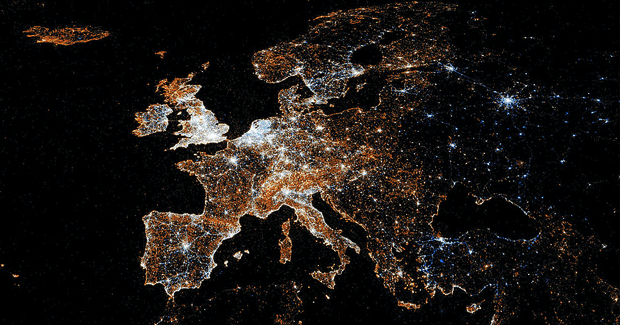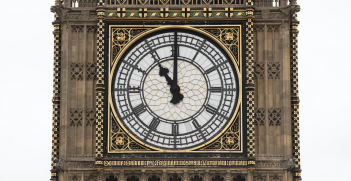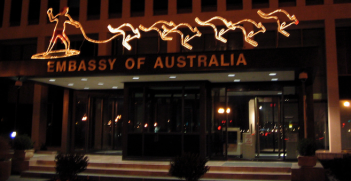New Year, New Troubles in Europe?

Europe has experienced another difficult year by virtue of economic challenges and political upheaval. The UK, Italy and Austria have all changed leaders and will face ongoing public pressure over their EU membership in 2017. Moreover, France’s looming presidential election may see the Eurozone’s problems increase.
This year’s fashionable blue and white lights are twinkling on Christmas trees in the capitals of Europe. But in the City of London, the square mile within the British metropolis that houses the world’s second most important financial market, there is little to celebrate.
Partners, directors and senior executives are now very frequent passengers on the Eurostar, the high-speed train that links London to Paris in a little over two hours. More than a dozen financial institutions, including some celebrated investment banks, are doing what they term ‘due diligence’ on moving their European headquarters. Many are considering a move across the Channel when UK Prime Minister Theresa May triggers Article 50 and gives two years notice to the 26 other members of the EU of Britain’s withdrawal.
May has said she will do this by March 2017. The ‘City’, the name by which the financial sector is known, is Britain’s single biggest earner, followed by the arms trade and services. Within the square mile, and especially at the independent Bank of England led by Mark Carney, a Canadian critic of the way Brexit is being handled, many believe not enough attention is being paid by May to the high risk of loss of income by the City.
This has been particularly apparent while the prime minister has been touring the Persian Gulf, meeting with Arab sheiks and shoring up the arms trade. To be fair to May, she has had to placate profound irritation in Riyadh at statements made by her foreign secretary, Boris Johnson, that the Saudis were conducting “proxy wars”, and “twisting and abusing religion and different strains of the same religion in order to further their own political ambitions”.
Yet Brexit and its impending collateral damage to the European economies, is far from the only reason for the worried frowns on the faces of diplomats in the continent’s chancelleries as they prepare for a problematic year ahead.
Relief that Austrians eventually turned their backs on the populist and far-right Norbert Hofer‘s bid to become president is mitigated by the fact that his Freedom Party, formed by Nazis in the 1950s, will still be looking to create an impact in the 2018 general election. While losing to the Greens’ Alexander Van der Bellen, Hofer got 46.7 per cent of the vote, and opinion polls currently have the Freedom Party ahead.
Whatever happens in Austria, an upheaval in next-door Italy looms following the failure of former Prime Minister Matteo Renzi to win the referendum on his constitutional reforms and his subsequent resignation. His centre-left party, under the new leadership of Paolo Gentiloni, will now have to fight an election possibly as early as the second quarter of 2017. It is the only political force in Italy in favour of remaining in the Eurozone and there is a high chance the populist Freedom Party will gain power and Italy will list to the right.
Of more pressing concern is a banking crisis triggered by the referendum failure. Although Gentiloni is a calmer man than Renzi, the result and the change of prime minister led big funds in the Milan market to lose a third of their value. Moreover, Italy’s leading bank, UniCredit, responded to the referendum result by announcing it was cutting thousands of jobs, shutting down almost a third of its branches, and asking shareholders to come up with €13 billion (A$18.4 billion) in capital—an indication of the shape of things to come.
The Eurozone’s third largest economy has shrunk by 10 per cent in 10 years and debts are mounting. Italy has suffered low growth, low productivity and labour market rigidity for more than 20 years—only Haiti and Zimbabwe have done worse on productivity.
Advisers are canvassing Gentiloni to seek a political union with Germany. Yet Berlin does not appear keen to play benefactor, requiring, as it would, a huge transfer of capital to the south, along with writing off billions of dollars of debt. Italy may well seek to follow its past and muddle through, but real doubts exist as to whether this is any longer possible.
In 2017, there is also the looming French election, with the unpopular François Hollande not seeking a second term. Rising support for the nationalist Marine Le Pen is evident, but she may now face fiercer resistance since François Fillon, the Republican candidate and a former prime minister, won a thumping victory in the centre-right primary.
That said, it’s plausible that Le Pen’s National Front could be more popular, given that Fillon is prescribing some unpalatable economic medicine for the cosseted French, including a 2 per cent rise in VAT, an end to the 35-hour working week in the bloated public sector, a €100 billion (A$141 billion) cut to public spending, the axing of 500,000 public sector jobs, and an increase in the retirement age to 65.
In the UK, as the City’s top finance houses do their due diligence on a move to Paris, it is clear they would only favour a Fillon presidency. A lurch further left or an embrace of Le Pen will have them either stay put—and hope for the best—or try and cover Europe from New York, which would suit Donald Trump.
Trump, it must be said, will strike a very hard bargain with the EU if it seeks to limit US subsidiaries freedom of action in Europe. He is also likely to force the Germans, Dutch and most others to pay more for the defence umbrella provided by NATO.
Curiously, Britain’s contribution to NATO and to the EU budget is May’s best—and realistically her only—bargaining chip. Chancellor Phillip Hammond and Bank of England Governor Carney have already reinforced their belief Britain must stay within the EU single market to avoid serious losses from Brexit. All talk of money saved by ceasing to be an EU member is just hollow talk. Many think Britain may have to pay more, as well as being liable for an exit fee, as well as agreeing to immigration quotas from Europe.
Which brings us to an inconvenient truth. Even if May has a successful negotiation with Brussels—and that is a very big if—she cannot get realistically get a better deal than the one the UK has already. That is, remaining in the EU and trying to prevent it falling apart, with the grim possibility of history being repeated. May’s cabinet is split on both policy and tactics, and this alone will make for an uncomfortable 2017, both in London and in Europe’s capitals.
Personal footnote: I’d hoped to see my dear friend, the distinguished Australian author and journalist Phillip Knightley before he died. Alas, aged 87, he passed away just as my plane landed at Heathrow. The Financial Times described him best, in a generous obituary, as “the most distinguished influential investigative journalist of his generation, a quiet but central figure in the golden age of Fleet Street”. It was Phillip who exposed the master Soviet spy Kim Philby, who led the inquiry into the shocking effects of the drug thalidomide, and who wrote the seminal book on war reporting Truth:the First Casualty. Journalism will be the poorer without him.
Colin Chapman is a writer, broadcaster and public speaker, who specialises in geopolitics, international economics, and global media issues. He is also the immediate past president of the AIIA in NSW.
This article is published under a Creative Commons Licence and may be republished with attribution.





